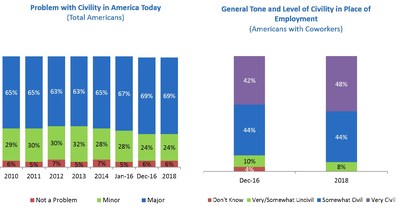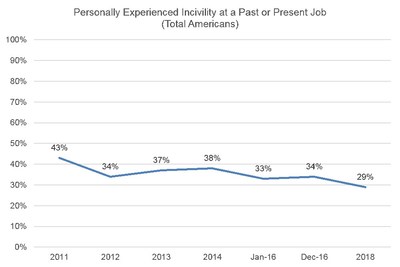93 Percent of Americans Agree the U.S. Has a Civility Problem, Yet 92 Percent of Employed Americans Report Their Workplace is Civil
-- Civil Workplaces are More Likely to be Diverse and Inclusive, According to New Survey --
NEW YORK, June 13, 2018 /PRNewswire/ -- An annual poll that tracks the state of civility in the United States once again finds that the vast majority of Americans – 93 percent – identify a civility problem in society, with most classifying it as a "major" problem (69 percent). Despite this unwavering sentiment since 2010, the general level of civility in the workplace is considered strong. More than nine in 10 Americans who work with others (92 percent) describe their place of employment as very or somewhat civil. Civility in America 2018: Civility at Work and In Our Public Squares by Weber Shandwick and Powell Tate was conducted in 2018 with KRC Research.
"Given that nearly all survey respondents consider incivility to be a problem in our country – a number that has not budged since the inception of the study – the fact that a similar proportion finds civility in their workplaces offers a ray of hope for this seemingly intractable social issue," said Andy Polansky, CEO of Weber Shandwick. "Companies should build on the important safe haven they provide employees and activate strategies that nurture even greater collegiality and respect around the organizational purpose, which, in turn, can deepen stakeholder relationships."
The Civil Work Zone
Not only does the overwhelming majority of Americans with coworkers describe their workplace as civil, but 27 percent report this level of civility to be an improvement compared to a few years ago. These positive indicators align with the general decline in the number of Americans on the whole who report ever having experienced incivility at work.
How do employers of civil workplaces create a civility safe haven? We compared respondents in civil environments to those who work in uncivil environments and found that civility is an organizational value. In civil workplaces, leadership is more likely to be perceived as civil (49 percent vs. 10 percent, respectively) and employees feel safer reporting uncivil conduct (33 percent vs. 17 percent). In uncivil workplaces, employees are more likely to distrust management to handle complaints about incivility (48 percent vs. 13 percent of employees in civil workplaces).
| Employees in Civil |
Employees in |
|
| % agree that… |
% |
% |
| The leadership where I work is civil |
49* |
10 |
| I feel safe to report incivility or harassment to my supervisor or someone in authority in my workplace, such as the Department of Human Resources |
33* |
17 |
| I do not trust management at my employer to handle complaints about incivility |
13 |
48* |
*significant difference
**small base size
Yet these findings do not mean that employees in uncivil work environments have accepted incivility as normal and give their leaders a pass. Approximately half of employees in both groups believe that leadership has a responsibility to enforce civility in the workplace. Furthermore, the research uncovered a lesson for those employers that don't instill a value of civility in their organizations: Incivility multiplies when not curbed – more than twice as many employees in uncivil workplaces as civil workplaces report they are hearing more uncivil comments at work than they used to (37 percent vs. 16 percent).
| Employees in Civil |
Employees in |
|
| % agree that… |
% |
% |
| Leadership has a responsibility to enforce civility in the workplace |
52 |
46 |
| I hear more uncivil comments in my workplace than I used to |
16 |
37* |
*significant difference
**small base size
Finally, when Americans overall are asked to respond to a list of actions that would improve the level of civility in the country, 42 percent are in favor of "civility training in the workplace" and 40 percent are in favor of "employers encouraging employees to report incivility in the workplace." It seems that the workplace may be ground zero for civility progress.
The Role of Diversity & Inclusion in the Civil Workplace
More than eight in 10 employees with coworkers (83 percent) describe their workplace as diverse and inclusive (definitions for diversity and inclusion presented in the survey can be found in the About the Research section below). Diversity and inclusion (D&I) is closely tied with civility in the workplace, as respondents in uncivil workplaces are twice as likely to characterize their employers as weak on diversity and inclusion (37 percent vs. 15 percent of civil workplaces).
| Employees in Civil |
Employees in |
|
| Workplace is diverse and inclusive |
85%* |
63% |
| Workplace is not diverse and inclusive |
15% |
37%* |
*significant difference
**small base size
The link between diversity and inclusion and respect-based cultures is poised to strengthen in the near future. More than four in 10 (42 percent) believe their workplace will become more diverse in the next few years while only 13 percent believe it will go in the opposite direction and become less diverse. D&I training is critical to moving this forward. Among employed survey respondents who have received D&I training at work, 65 percent find it useful. Additionally, two-thirds (66 percent) believe D&I training should be mandatory at their place of employment.
Despite the preponderance of D&I workplaces, the leadership of organizations rarely reflects the employee base. Only one-third (33 percent) of all employees in our study agree that the leadership where they work is diverse and inclusive, indicating a gap at the most senior levels. This figure only rises to 38 percent for those employers that are considered diverse and inclusive by employees.
"Our research makes it clear that employees expect greater diversity and inclusion in their workplaces," said Tai Wingfield, who leads Weber Shandwick's Diversity, Equity and Inclusion specialty. "The evidence that D&I also contributes to civility and respect among colleagues suggests that acknowledging, addressing and adapting to our differences is a business imperative that companies must embrace to build reputations and organizational endurance in the future."
Please click here for the full Civility in America 2018: Civility at Work and In Our Public Squares report and presentation.
About the Research
Annually since 2010, Weber Shandwick and Powell Tate, in partnership with KRC Research, have released Civility in America: A Nationwide Survey. KRC Research conducted this eighth wave of the Civility in America survey online from January 2, 2018 to January 17, 2018, among a sample of 1,481 U.S. adults 18 years and older, drawn from a national consumer panel. The survey was conducted in both English and Spanish, as determined by the respondent's preference. KRC established demographic quotas and weighted data based on U.S. Census data (age, gender, education, income, race/ethnicity and region).
D&I definitions presented in questionnaire: By "diversity" we mean that the place you work has representation of all kinds of people, across sex, race, class, age and other categories. By "inclusion" we mean how well people of these different categories are equally valued, respected, and supported by leaders, managers and other employees in the workplace.
About Weber Shandwick
Weber Shandwick is a leading global communications and marketing services firm in 78 cities with a network extending to 128 cities around the world. The firm's diverse team of strategists, analysts, producers, designers, developers and campaign activators has won the most prestigious awards in the world for innovative, creative approaches and impactful work. Weber Shandwick was the only public relations agency included on the Advertising Age Agency A-list in 2014 and 2015 and the only PR firm designated an A-List Agency Standout in 2017 and 2018. Weber Shandwick was honored as PRWeek's Global Agency of the Year in 2015, 2016, 2017 and 2018, The Holmes Report's Global Agency of the Year in 2010, 2012, 2014, 2015 and 2017, and The Holmes Report's Global Digital Agency of the Year in 2016. The firm deploys deep expertise across sectors and specialty areas, including consumer marketing, corporate reputation, healthcare, technology, public affairs, financial services, employee engagement, social impact, financial communications and crisis management, using proprietary social, digital and analytics methodologies. Weber Shandwick is part of the Interpublic Group (NYSE: IPG). For more information, visit http://www.webershandwick.com.
About Powell Tate
Founded by two of Washington, D.C.'s most respected press secretaries – Democrat Jody Powell and Republican Sheila Tate – Powell Tate has been one of Washington, D.C.'s leading public affairs firms for more than two decades, maintaining its bipartisan heritage while developing cutting edge programs that communicate across the political aisle and multiple platforms. Recently cited as one of Washington, D.C.'s "Best Places to Work" by the Washington Post and Washington Business Journal, Powell Tate is a division of Weber Shandwick. For more information, visit www.powelltate.com.
About KRC Research
KRC Research is a global full-service nonpartisan opinion research and strategy firm. A unit of the Interpublic Group of Companies (NYSE: IPG), KRC Research offers the quality and custom service of a small firm with the reach of a global organization. For over 30 years, KRC Research has worked on behalf of corporations, governments, not-for-profits and the communications firms that represent them. Staffed with multidisciplinary research professionals, KRC combines sophisticated research tools with real-world communications experience. For more information, visit www.krcresearch.com
| Contact: |
Kimberly Dixon |
| Company: |
Weber Shandwick |
| Phone: |
212.546.7876 |
| Email: |
SOURCE Weber Shandwick
Related Links
WANT YOUR COMPANY'S NEWS FEATURED ON PRNEWSWIRE.COM?
Newsrooms &
Influencers
Digital Media
Outlets
Journalists
Opted In






Share this article